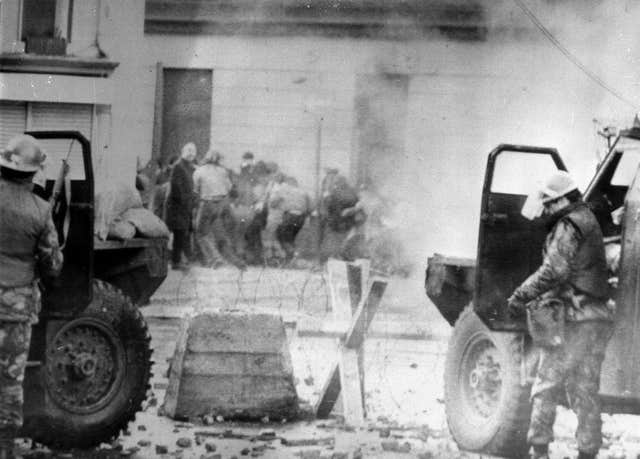
One of the founders of Northern Ireland’s civil rights movement has backed calls to prosecute former soldiers over the Bloody Sunday killings.
Former MP Ivan Cooper, 75, still regards the fatal shooting of 13 people in Londonderry on January 30 1972 following a civil rights march with disbelief.
Thirteen died on the day, with 15 others shot and injured by soldiers from support company of the 1st Battalion Parachute Regiment.

All 13 victims were declared innocent in 2010 following a 10-year public inquiry conducted by Lord Saville.
Then-prime minister David Cameron issued a public apology to the families on behalf of the state following the report.
An investigation by the Police Service of Northern Ireland (PSNI) followed the £195 million inquiry and files were submitted to the region’s Public Prosecution Service (PPS) in 2016 and 2017 for consideration.
On Thursday the PPS is set to announce whether it will pursue prosecutions against some or any of 20 suspects.
This number includes 18 soldiers, one of whom has since died, and two Official IRA suspects.

John Kelly, whose 17-year-old brother Michael was among those shot dead, said it is a day the families have been waiting for with great expectation after 47 years.
Mr Cooper, one of the civil rights leaders on the march that day, backed the families calling for prosecutions, saying “murder is murder”.
Lord Ramsbotham, who was military assistant to the chief of the general staff at the time of Bloody Sunday, has cautioned against the step.
He said: “I hope that they are not prosecuted because it sets a very difficult precedent. It’s a very dangerous precedent.”
The question has seen Northern Ireland’s parties split.
Democratic Unionist MP Gregory Campbell also expressed concern about the sort of precedent it would set in terms of dealing with Northern Ireland’s troubled past.
Ulster Unionist MP and former soldier Doug Beattie said if there is evidence that individuals broke the law on that day then they should face the law, adding that “so should the IRA members present that day”.
Sinn Fein and the SDLP have backed calls for prosecutions.
While one of the injured died five months later in hospital, from an inoperable brain tumour, the Saville Report did not link his death to the wounds he sustained on Bloody Sunday.
Many view John Johnson as the 14th person who died as a result of the violence.
He was shot twice on Bloody Sunday but his death was attributed to a brain tumour.
Saville found: “We are satisfied that John Johnston’s death was not the result of any of the wounds he sustained on Bloody Sunday.”
Recalling the day itself, Mr Cooper told the Press Association he still feels a sense of disbelief.
“I couldn’t believe it, I couldn’t believe that people would shoot their kith and kin, the most outrageous thing I have ever seen,” he said.
“I believe more than anything else: thou shalt not kill, thou shalt not murder.
“Murder, that’s what it was.

“I have no time for them, they shot people down in cold blood.
“In my church the commandment says ‘thou shalt do no murder’, and I believe that commandment.
“They have to face justice, if Theresa May has any justice in her heart – and she is the daughter of a vicar, so she knows the same principles that I know.”
Mr Cooper also expressed his admiration for the late Bishop Edward Daly, who ran through a hail of bullets to help the wounded while waving a white handkerchief.
“I am not a Catholic, but the admiration I had for that man that day, it was amazing,” Mr Cooper said.
“I had seen him running, and I can never forget his bravery.
“He was a very brave man that day because the bullets were flying around so much so that I remember taking refuge at the side of a car.”
Mr Cooper said he was one of very few Protestants who led the civil rights movement and later went on to become a joint founder of the SDLP along with John Hume, Paddy Devlin and Gerry Fitt.
He said for doing so he was often spurned by other Protestants who were unionists, and even found people in his church refused to sit beside him on the pews.
But he said what he did was right.

Enjoy the convenience of having The Sunday Post delivered as a digital ePaper straight to your smartphone, tablet or computer.
Subscribe for only £5.49 a month and enjoy all the benefits of the printed paper as a digital replica.
Subscribe